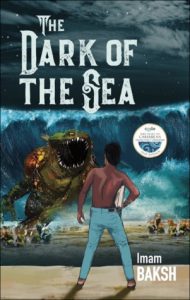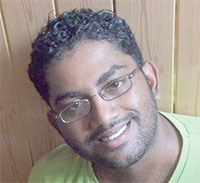“The Dark of the Sea” is the second novel by Guyanese writer, Imam Baksh. Like its predecessor, “Children of the Spider”, the book won the Burt Award for Caribbean Young Adult Literature, as part of the Bocas Literature Festival.
I really appreciate “The Dark of the Sea” because I think that it is a great story that young people and children will love. It is exactly the kind of novel that I needed as a child when my idea of what fantasy literature could be was limited to the ‘Harry Potter’ series, the Enid Blyton books, the ‘Lord of the Rings’ saga, and other examples from the British fiction canon. Having read “The Dark of the Sea,” I do believe that it is indeed rewarding to come across settings, characters, and stories, through works written by authors like Baksh, that are uniquely and blatantly Guyanese. In writing about the Guyanese experience, not only are readers given insight into what it means to be a person living in Guyana, but also perspectives surrounding the concerns, values, history, and culture of Guyanese people are also tapped into, and these are definitely some of my favourite things about this novel.
While “Children of the Spider” presented a stranger who is transported to Guyana, “The Dark of the Sea” focuses on a young boy, named Danesh, who lives on the Essequibo Coast, and the way he becomes embroiled in the machinations of an undersea community of what we in Guyana refer to as ‘fair maids’ – mermaid-like creatures who are represented as both benign and evil in variations of local legends.

Danesh, as the hero of the story, is immediately likeable. This is due, in part, to the visibility of his Guyanese qualities that one might be able to find in any of several random boys plucked from the Guyanese countryside. Danesh grows up in a religious family, and he has a great disdain for school. He is knowledgeable about aspects of technology. He dislikes his teachers – who are not particularly great teachers, or human beings, for that matter – and, conversely, he has a great love for his friends. He loiters on the shore and on the islands in the Essequibo River, and it is during one of these escapades that he has an encounter with a ‘fair maid’ named Medusa. At first, she tries to kill him (in a really intense and expertly written fight sequence), but before long and due to greater threats facing both Medusa and Danesh’s worlds, the two must band together and join forces along with the ‘fair maid’ warriors of the mystical, underwater, domain of Coral City to protect the world from a giant, toad-like, and an extremely powerful villain named Zadoq’ua.
Of course, as YA fantasy, the novel is an exciting, fresh, and very well-written example of Guyanese literature. There is no doubt that it will satisfy any younger reader who chooses to read it, regardless of whether that person knows anything about Guyana or not. There are mythical creatures, epic battles, betrayals, references to Greek myth, a giant squid, the Hindu god, Vishnu, and so many other cool elements that are sure to enthrall readers.
However, for me, the most important thing about the novel has to do with its treatment of several themes that come directly from the Guyanese experience. The first of these is the Guyanese model of education, which the author justifiably satirizes throughout the text. For example, the hypocrisy that exists with teachers who are natural Creole speakers but are trying to get students to speak Standard English is both a hilarious and tragic reality of the failure of the education system in Guyana. This failure is also compounded in the novel with the inability of any of Danesh’s teachers to identify that he has a reading impediment. Instead, he is passed over and is regarded as being incapable of learning. This too is another element taken from the very real world of the Guyanese school system. It really highlights the failures of the system, in which many teachers are complicit.
Additionally, the topic of suicide also appears in the novel. I was surprised that this element was addressed, but lately, I have been feeling that YA novels are a lot darker these days. Maybe this has something to do with the state of the world, or maybe YA has always been that way and we never really noticed as young people. I mean, “The Hunger Games” novels deal with teenagers hacking each other to death as a form of entertainment, so, there’s that. The treatment of suicide, from my point of view, is important because suicide has not been discussed enough in Guyanese literature. There are not enough stories, plays, or poems that represent this issue, and that is extremely unfortunate because suicide is one of the most pressing issues in Guyana, particular in the rural areas, such as where “The Dark of the Sea” is set, so kudos to the writer for being brave and cognizant enough to write it into his book.
Lastly, one other important element that belongs to Guyana that Baksh has represented in the novel is the issue of storytelling. Danesh may not be a good student, but he is a good storyteller. Equally important is the fact that he is good at receiving stories from others.
There are some scenes, for example, when he is in the ocean, visiting Coral City with the ‘fair maids’, and he spends long periods listening to the stories they tell and, in turn, shares his own stories with the ‘fair maids’. In the text, stories are not just stories, but vessels containing valuable pieces of information that can benefit the hero. Perhaps the lesson here is that the traditional education system is not the only source of knowledge, or perhaps it is a call for a return to the oral forms of storytelling, or it might be a reminder that each story contains some truth that is essential to both speaker and listener. Whatever the case, I do feel like the novel advocates for storytelling and I think that that is indeed a grand thing to see. Also, I love irony, and there is no doubt that advocating for storytelling traditions in the form of a story (the novel) is a pretty awesome thing to do.
In the end, I find that “The Dark of the Sea” was a better read than “Children of the Spider” (which is, itself, a pretty good read), and I think that it is essential that more local YA fans (of which there are many) find time to read, appreciate, and share the work of Imam Baksh. He is one of the local authors that has the talent and potential to become J.K. Rowling-famous one day.




.png)









